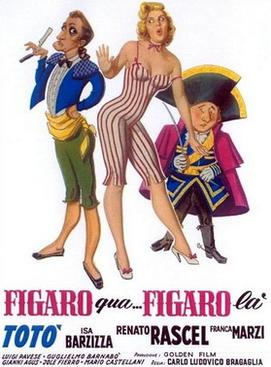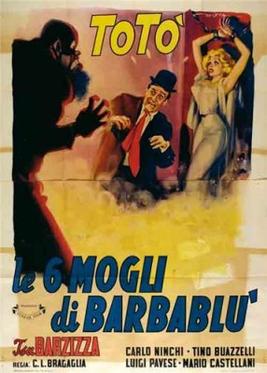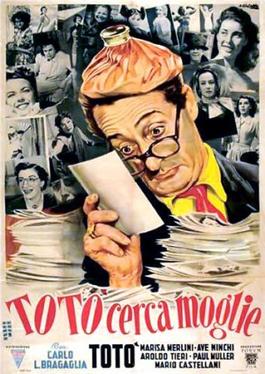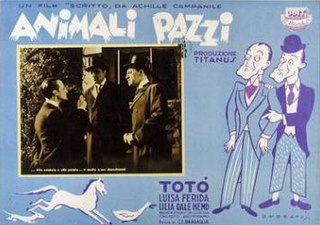
Don Giovanni is an opera in two acts with music by Wolfgang Amadeus Mozart to an Italian libretto by Lorenzo Da Ponte. Its subject is a centuries-old Spanish legend about a libertine as told by playwright Tirso de Molina in his 1630 play El burlador de Sevilla y convidado de piedra. It is a dramma giocoso blending comedy, melodrama and supernatural elements. It was premiered by the Prague Italian opera at the National Theatre, now called the Estates Theatre, on 29 October 1787. Don Giovanni is regarded as one of the greatest operas of all time, and has proved a fruitful subject for commentary in its own right; critic Fiona Maddocks has described it as one of Mozart's "trio of masterpieces with librettos by Da Ponte".

Antonio Griffo Focas Flavio Angelo Ducas Comneno Porfirogenito Gagliardi De Curtis di Bisanzio, best known by his stage name Totò, or simply as Antonio de Curtis, and nicknamed il principe della risata, was an Italian actor, comedian, screenwriter, dramatist, poet, singer and lyricist. He is commonly referred to as one of the most popular Italian performers of all time. While best known for his funny and sometimes cynical comic characters in theatre and then many successful comedy films made from the 1940s to the 1960s, he also worked with many iconic Italian film directors in dramatic roles.

The Rules of the Game is a 1939 French satirical comedy-drama film directed by Jean Renoir. The ensemble cast includes Nora Gregor, Paulette Dubost, Mila Parély, Marcel Dalio, Julien Carette, Roland Toutain, Gaston Modot, Pierre Magnier and Renoir.

The Barber of Seville or the Useless Precaution is a French play by Pierre Beaumarchais, with original music by Antoine-Laurent Baudron. It was initially conceived as an opéra comique, and was rejected as such in 1772 by the Comédie-Italienne. The play as it is now known was written in 1773, but, due to legal and political problems of the author, it was not performed until February 23, 1775, at the Comédie-Française in the Tuileries. It is the first play in a trilogy of which the other constituents are The Marriage of Figaro and The Guilty Mother.

Mario Alberto Ettore Monicelli was an Italian film director and screenwriter, one of the masters of the commedia all'italiana. He was nominated six times for an Oscar, and received the Golden Lion for his career.

Lamerica is a 1994 Italian drama film directed by Gianni Amelio. It entered the competition at the 51st Venice International Film Festival, in which Amelio won the Golden Osella for Best Director. The film was selected as the Italian entry for the Best Foreign Language Film at the 67th Academy Awards, but was not accepted as a nominee.

Alessandro Blasetti was an Italian film director and screenwriter who influenced Italian neorealism with the film Quattro passi fra le nuvole. Blasetti was one of the leading figures in Italian cinema during the Fascist era. He is sometimes known as the "father of Italian cinema" because of his role in reviving the struggling industry in the late 1920s.
"Largo al factotum" is an aria (cavatina) from The Barber of Seville by Gioachino Rossini, sung at the first entrance of the title character, Figaro. The repeated "Figaro"s before the final patter section are an icon in popular culture of operatic singing. The term "factotum" refers to a general servant and comes from Latin where it literally means "do everything".

Treasure of San Gennaro is a 1966 Italian comedy film starring Nino Manfredi, Senta Berger, Totò and Claudine Auger. It is directed by Dino Risi and is a funny classic story of a perfect robbery plan gone wrong in the Italian way. It was entered into the 5th Moscow International Film Festival where it won a Silver Prize.

Cops and Robbers is a 1951 Italian cult comedy film directed by Steno and Mario Monicelli. It stars the famous comedian Totò, and the cinematographer was the future film director Mario Bava. It was produced by Dino De Laurentiis and Carlo Ponti.

Toto in Color is a 1952 Italian comedy film, the first Italian color film shot with the Ferraniacolor system. It was directed by Steno and starred the comic actor Totò. In 2008, the film was included on the Italian Ministry of Cultural Heritage’s 100 Italian films to be saved, a list of 100 films that "have changed the collective memory of the country between 1942 and 1978."

Antonio "Toto" Cotogni was an Italian baritone of the first magnitude. Regarded internationally as being one of the greatest male opera singers of the 19th century, he was particularly admired by the composer Giuseppe Verdi. Cotogni forged an important second career as a singing teacher after his retirement from the stage in 1894.

Neapolitan Turk is a 1953 Italian comedy film directed by Mario Mattoli and starring Totò.

Renato Ranucci, known by the stage name Renato Rascel, was an Italian film actor and singer. He appeared in 50 films between 1942 and 1972. He represented Italy in the Eurovision Song Contest 1960 with the song "Romantica", which tied for eighth place out of thirteen entries.

A Slice of Life is a 1954 Italian comedy film directed by Alessandro Blasetti and Paul Paviot.

Figaro Here, Figaro There is a 1950 Italian historical comedy film directed by Carlo Ludovico Bragaglia and starring Totò and Isa Barzizza. The title and the plot allude to The Barber of Seville. It was made at Scalera Studios in Rome. Set design was by Alberto Boccianti.

Bluebeard's Six Wives is a 1950 Italian comedy film directed by Carlo Ludovico Bragaglia, and starring Totò, Isa Barzizza and Carlo Ninchi. The film's sets were designed by the art directors Alberto Boccianti and Mario Rappini.

Toto Looks for a Wife is a 1950 Italian comedy film directed by Carlo Ludovico Bragaglia and starring Totò, Ave Ninchi and Marisa Merlini.

Mad Animals is a 1939 Italian "white-telephones" comedy film directed by Carlo Ludovico Bragaglia and starring Totò, Luisa Ferida and Calisto Bertramo. It was made at the Titanus Studios in Rome.

Saint John, the Beheaded is a 1940 Italian comedy film directed by Amleto Palermi and Giorgio Bianchi and starring Totò, Titina De Filippo and Silvana Jachino. It was based on a play by Nino Martoglio. The film was made at the Cinecittà Studios in Rome.




















